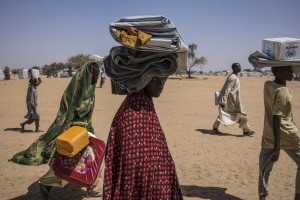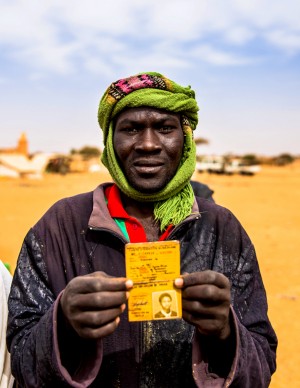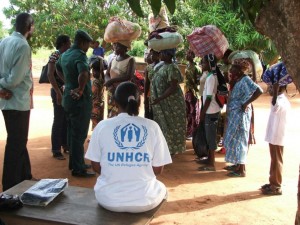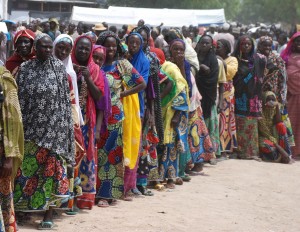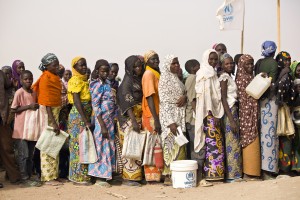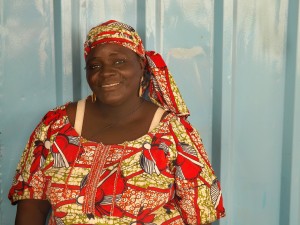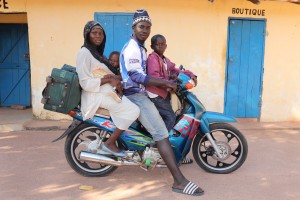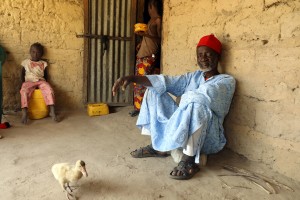Cameroon, Nigeria and UNHCR sign a tripartite agreement on the returns of Nigerian refugees living in Cameroon
The agreement clearly stipulates that repatriation should only take place on a voluntary basis and that refugees who will not opt to return will not be forced to go back to Nigeria
YAOUNDÉ, CAMEROON, 2 March 2017 – The Governments of the Republic of Cameroon and the Federal Republic of Nigeria together with UNHCR, the UN Refugee Agency have today signed the Tripartite Agreement for the Voluntary Repatriation of Nigerian refugees living in Cameroon.
The Tripartite Agreement is a legal framework setting out the modalities for the voluntary return of refugees to their country of origin in safety and dignity. More than 85,000 Nigerian refugees who fled the Boko Haram insurgency in northeastern Nigeria, are currently living in the Far North Region of Cameroon. Of this number, about 62,000 live in Minawao refugee camp. A recent profiling exercise undertaken by the International Organization for Migration recorded more than 23,000 refugees residing in host communities. In addition, UNHCR believes that there are thousands more Nigerians who fled the violence but have not been reached by aid agencies because of the prevailing insecurity in those areas.
“The Government of Cameroon will continue to ensure the protection of Nigerian refugees on its territory and will spare no effort to help those who wish to return to Nigeria, in accordance with international agreements” said René Emmanuel, Cameroon’s Minister of Territorial Administration and Decentralization.
The parties agreed to provide people wishing to return with clear information on the situation prevailing in their areas of return particularly in Borno, Yobe and Adamawa States in northeastern Nigeria in order to allow them to make a well informed and voluntary decision. This includes, among others, information on the security and economic situation as well as access to basic services.
In September 2016, a UNHCR survey conducted in Minawao camp on the intentions of refugees to return to Nigeria revealed that 71 percent of the representative sample (9,300 individuals) expressed their intention to return as soon as the situation is conducive in their areas of origin.
“Nigeria is pleased to be part of this agreement because it highlights the importance of working together to bring a lasting solution to the refugee situation of our citizens,” said the Nigerian Minister of Interior Lt. Gen. (Rtd) Abdulrahman Bello Dambazau CFR. “We, as a government, remain committed to ensuring that we create the conducive atmosphere to facilitate the return of our citizens in safety and dignity and in line with international protection principles”.
The UNHCR Representation in Nigeria will continue to monitor conditions in the areas of return to ensure that once return operations are initiated, returns are conducted in accordance with the tripartite agreement. The agreement clearly stipulates that repatriation should only take place on a voluntary basis and that refugees who will not opt to return will not be forced to go back to Nigeria.
“We are delighted with this agreement,” said Kouassi Lazare Etien, UNHCR Representative in Cameroon. “Signing this agreement reveals a real desire by Cameroon and Nigeria to find a durable solution for the refugees who are willing to return in safety and dignity with the support of UNHCR”. The signatories to the agreement today also established a Tripartite Commission that will oversee the implementation of the Agreement. The Nigerian delegation will visit the Minawao refugee camp to inform the refugees about the signature of the agreement.
In Cameroon, UNHCR works in close collaboration with the Government to provide protection and assistance to 365,000 refugees and asylum-seekers with the majority living in the East, Adamaoua, North and Far North Regions. UNHCR’s interventions also target more than 190,000 internally displaced persons as well as host communities in the affected regions. Also in Nigeria, UNHCR is supporting the government to address the life-saving needs of more than 1.8 million Internally Displaced Persons affected by the insurgency.
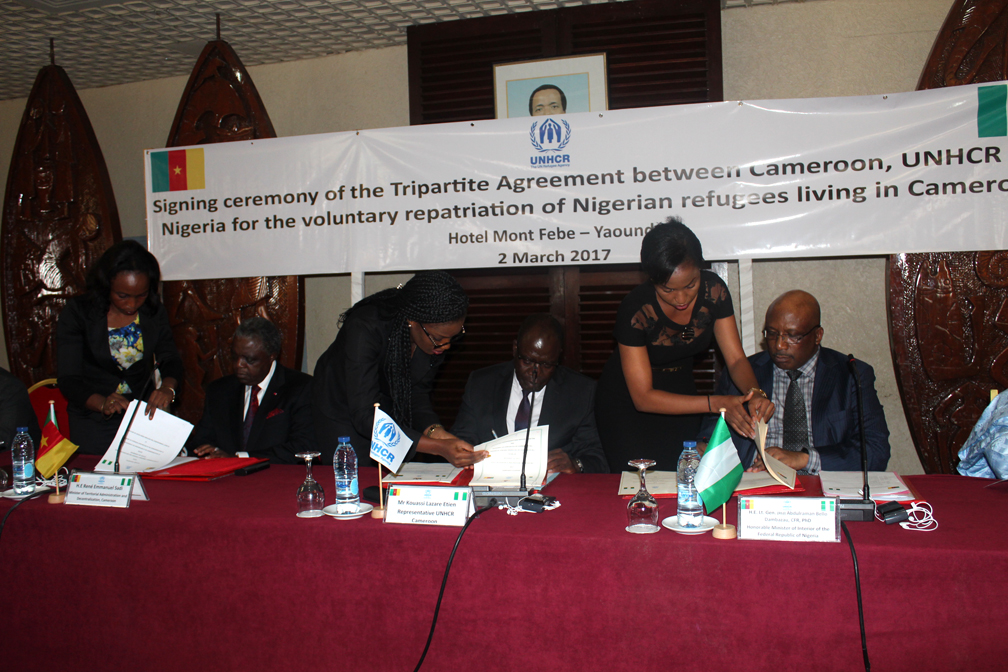
René Emmanuel Sadi, Cameroon Minister of Territorial Administration and Decentralization; Kouassi Lazare Etien, UNHCR Representative in Cameroun and Lieutenant-General Abdulrahman Bello Dambazau for Nigeria sign the tripartite agreement for the voluntary repatriation of Nigerian refugees living in Cameroon to their country. The ceremony took place on 2 March 2017 in Cameroon’s capital Yaoundé. UNHCR / Simplice Kpandji
For more information, please contact:
UNHCR in Cameroon
Raïssa Touraire Ngou: ngou@unhcr.org + 237 693 01 73 80;
Kabami Kalumiya: kalumiya@unhcr.org + 237 691 14 12 26
UNHCR In Nigeria
Hanson Ghandi Tamfu:tamfu@unhcr.org; Tel: +234 8090359400
Tom Winston Monboe: monboe@unhcr.org; Tel: +234 8090160763
Ministry of Interior in Nigeria
Ehisienmen Osaigbovo, press secretary, +234 8060914051
UNHCR Dakar
Simplice Kpandji: kpandji@unhcr.org, + 221 77 333 9883, + 237 694 61 05 74;
Le Cameroun, le Nigeria et le HCR signent un accord tripartite sur le retour des réfugiés nigérians vivant au Cameroun
L'accord stipule clairement que le rapatriement ne devrait avoir lieu que sur une base volontaire et que les réfugiés qui ne choisissent pas de revenir ne seront pas obligés de retourner au Nigeria.
YAOUNDÉ, CAMEROUN, 2 mars 2017. Les gouvernements de la République du Cameroun et de la République Fédérale du Nigéria, ainsi que le HCR, l'Agence des Nations Unies pour les réfugiés ont signé aujourd'hui l'Accord Tripartite pour le rapatriement volontaire des réfugiés nigérians vivant au Cameroun.
L'Accord Tripartite est un cadre juridique qui définit les modalités du retour volontaire des réfugiés dans leur pays d'origine dans la sécurité et la dignité. Plus de 85 000 réfugiés nigérians qui ont fui l'insurrection de Boko Haram dans le nord-est du Nigeria vivent actuellement dans la région de l’Extrême Nord du Cameroun. Environ 62 000 d’entre eux vivent dans le camp de réfugiés de Minawao. Un exercice récent de profilage entrepris par l'Organisation Internationale pour les Migrations a enregistré plus de 23 000 réfugiés résidant dans des communautés d'accueil. De plus, le HCR croit qu'il y a des milliers d'autres Nigérians qui ont fui les violences, mais qui, en raison de l'insécurité qui régnait dans ces régions, n’ont pu être atteintes par les agences humanitaires.
"Le Gouvernement du Cameroun continuera d'assurer la protection des réfugiés nigérians sur son territoire et ne ménagera aucun effort pour aider ceux qui souhaitent retourner au Nigéria conformément aux accords internationaux " a déclaré René Emmanuel Sadi, Ministre camerounais de l'Administration Territoriale et de la Décentralisation
Les parties ont convenu de fournir aux personnes souhaitant retourner des informations claires sur la situation dans leurs zones de retour, en particulier dans les États de Borno, Yobe et Adamawa, dans le nord-est du Nigeria, afin de leur permettre de prendre une décision informée et volontaire. Cela comprend, entre autres, des informations sur la sécurité et la situation économique ainsi que sur l'accès aux services de base.
En septembre 2016, une enquête du HCR menée au camp de Minawao sur les intentions des réfugiés de retourner au Nigeria a révélé que 71% des personnes interrogées sur un échantillon représentatif de 9 300 personnes, ont exprimé leurs intentions de rentrer dans leurs zones d’origine dès que la situation le permettra.
«Le Nigéria est heureux de faire partie de cet accord parce qu'il souligne l'importance de travailler ensemble pour apporter une solution durable à la situation des réfugiés, qui sont nos concitoyens » a déclaré le Ministre nigérian de l'Intérieur, le Lieutenant-Général Abdulrahman Bello Dambazau. « En tant que gouvernement, nous demeurons engagés pour nous assurer que nous créons une atmosphère propice afin de faciliter le retour de nos citoyens dans la sécurité et la dignité et cela conformément aux principes de protection internationale ",.
La Représentation du HCR au Nigéria continuera de faire le suivi de la situation dans les zones de retour pour s'assurer, qu’une fois initiés, ces retours seront effectués conformément aux termes de l'accord tripartite. L'accord stipule clairement que le rapatriement ne devrait avoir lieu que sur une base volontaire et que les réfugiés qui ne choisissent pas de revenir ne seront pas obligés de retourner au Nigeria.
« Nous sommes ravis de cet accord », a souligné Kouassi Lazare Etien, Représentant du HCR au Cameroun. « Sa signature révèle un réel désir du Cameroun et du Nigéria de trouver une solution durable pour les réfugiés qui sont prêts à retourner en toute sécurité et dignité avec le soutien du HCR ».
Les signataires de l'accord ont également créé aujourd'hui une Commission Tripartite qui supervisera sa mise en œuvre. La délégation nigériane se rendra au camp de réfugiés de Minawao pour informer les réfugiés de la signature de cet accord.
Au Cameroun, le HCR travaille en étroite collaboration avec le Gouvernement pour assurer la protection et l'assistance de 365 000 réfugiés et demandeurs d'asile dont la majorité vit dans les régions de l'Est, de l'Adamaoua, du Nord et de l’Extrême Nord. Les interventions du HCR visent également plus de 190 000 personnes déplacées à l'intérieur du pays et des communautés d'accueil. Au Nigéria, le HCR appuie le gouvernement pour répondre aux besoins d’assistance de plus de 1,8 million de personnes déplacées à l'intérieur du pays touchées par l'insurrection.
Pour plus d’informations, merci de contacter:
UNHCR au Cameroon
Raïssa Touraire Ngou: ngou@unhcr.org + 237 693 01 73 80;
Kabami Kalumiya: kalumiya@unhcr.org + 237 691 14 12 26
UNHCR au Nigeria
Hanson Ghandi Tamfu:tamfu@unhcr.org; Tel: +234 8090359400
Tom Winston Monboe: monboe@unhcr.org; Tel: +234 8090160763
Ministere de l’Interieur au Nigeria
Ehisienmen Osaigbovo, secretaire de presse, +234 8060914051
UNHCR Dakar
Simplice Kpandji: kpandji@unhcr.org, + 221 77 333 9883, + 237 694 61 05 74;
